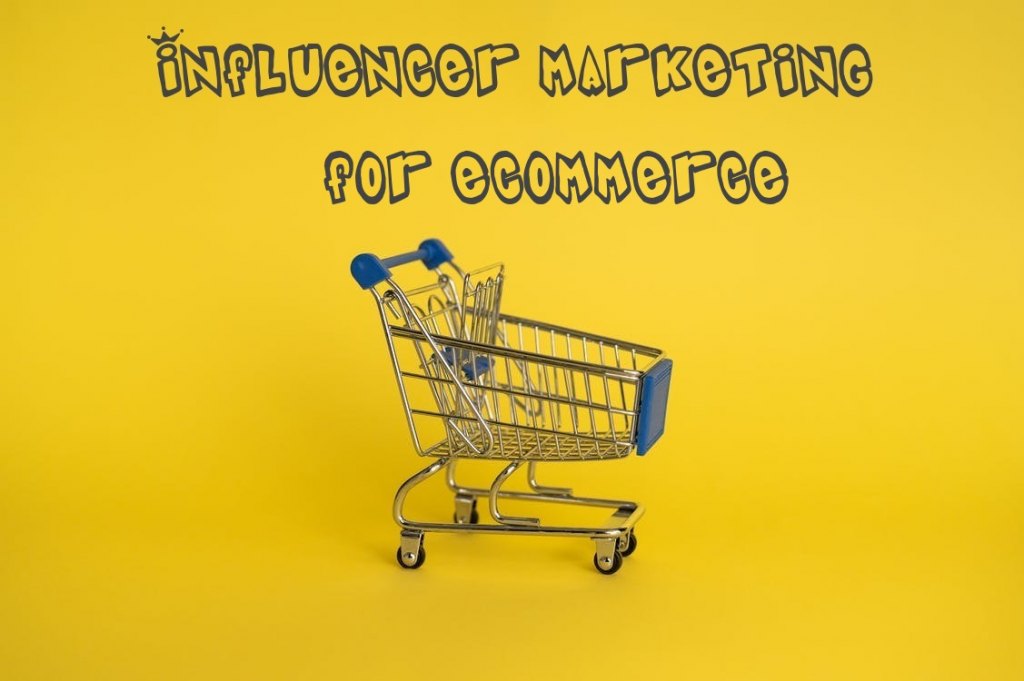
If you’re looking to grow your eCommerce business, influencer marketing can be a powerful tool. It’s an effective way to reach new customers and get them excited about your brand.
But what are influencers? And why should you work with them?
Influencers are people — either individuals or groups — who have been recognized by their peers as authorities on a given topic. They have influence over their audience because they understand the subject matter and can guide people toward positive outcomes.
They also have credibility with their audience because they are not simply pushing your product on them, but rather are sharing their experience of using your product.
This makes influencer marketing very effective in terms of increasing brand awareness and driving sales.

[Source]
Building an eCommerce brand takes time and effort, but ranking on search engines is also equally time-consuming and is a long-term strategy.
Influencer marketing helps with enhancing brand value while enabling customer acquisition in the short term.
The cost of hiring an influencer is much lesser than traditional advertising methods such as print ads or TV commercials, which are expensive and (mostly) ineffective.
Influencer Marketing vs Affiliate Marketing
Although both are similar in some ways, they carry a few key differences:
- Influencer marketing is a relatively new trend that has become increasingly popular in the last decade or so. It is essentially using someone who has a large following on social media or elsewhere to promote your product or service in exchange for compensation.
- Affiliate marketing involves paying people with an existing audience to promote your products or services in exchange for commissions.
- Affiliate marketers can be bloggers, influencers, or even just other businesses.
- Influencer marketing makes use of individual persona to endorse products.
Affiliate marketing can be from a personal or impersonal brand. For example, a reputed tech blog recommends a particular smartphone
- The main difference between the two is in how influencers and affiliates get paid for their efforts.
- With affiliate marketing, affiliates receive a commission every time someone buys something after clicking on one of the affiliate links.
- With influencer marketing, influencers typically get paid on the basis of the number of touch points and messaging around your content, rather than just conversions like with affiliate marketing.
- Successful influencers typically generate organic exposure for their campaigns. This is because of a following they have already generated from past work.
Affiliate marketing does not necessarily need this. Experienced affiliate marketers can launch a new blog that is targeted to your niche, and build an inorganic traffic stream through paid ad campaigns.
How To Find The Right Influencers For Your eCommerce Store
The first step to building a successful eCommerce business is understanding your audience.
If you’re not sure who your audience is, it’s time to get started by creating a customer persona. A customer persona is a fictional person who represents the key elements of your ideal customer. They might be an 18-year-old student or an 85-year-old retiree, but they all have one thing in common: they want to buy from you!

[Source]
The best influencers have a strong following, often because they’ve been featured in other top brands’ videos or written content. They’re also likely to have a loyal following on social media platforms like Facebook, Twitter, Instagram, and Pinterest.
But remember that a strong following doesn’t always imply true and deep engagement. So, it’s important to not solely focus on the number of followers, but also enquire and receive evidence (in a screenshot) format of their engagement rate.
If you’re not sure if your influencer fits these criteria, here are some things to look for:
Frequency of posts from past posts: Look at what type of content the influencer has published in the past and see if it matches your brand’s style. If you don’t see any recent posts from them that match, then it may be time to find another influencer who can deliver content that resonates with your target audience.
Number of followers: The bigger an influencer’s following, the better chance they’ll be able to grow yours as well. Find out how many people follow them on social media platforms like Facebook and Twitter so you can compare their numbers with those of other potential influencers in your niche.
Price: The price of an influencer campaign increases with the size of the following. But a larger following does not always mean more sales. It depends on the quality of followers that each influencer has, their engagement rate, and other factors like their previous experience in the industry or past success with campaigns.
Engagement Depth: Look at the follower and engagement rates of their posts and pay attention to their niche. It is important to verify if their followers are real (or pumped up numbers), etc. If you’re interested in beauty products, you will want to look for people who have a huge following in beauty and fashion. If you sell clothing and accessories, you should buy from influencers who have a large following in fashion but don’t follow fashion trends.

[Source]
- Microtargeted influencers – these are people who have a very specific following that matches your target audience.
- Macrotargeted influencers – these are people who have a larger following but are not microtargeted to your target audience.
For example, if you sell clothing and your target audience is women aged 18-34, then an Instagrammer who has 3K followers but only posts photos of their kids would not be the best option for you. They may be popular, but they aren’t microtargeted to your audience and won’t provide much value for the money spent on them.
How To Plan An Influencer Marketing Campaign
Influencer marketing is a powerful way to get your product in front of the right people at the right time. It’s also a great way to build trust with customers who are already loyal to you.
There are a lot of moving parts in managing an influencer marketing campaign. So, it is a good idea to start small and focus on one or two campaigns before handling bigger projects.
Influencer marketing is not just about getting product reviews or press coverage; it’s also about building relationships with your audience so they can be ambassadors for your brand.
Here are some strategies that will help you craft an effective influencer marketing campaign:
Identify your goal: Do you want to build a brand, or find conversions? If you’re looking to build a brand, you can find multiple influencers talking about your product — thus creating an impression of virality. If you want to increase conversion rate, then focus on 1-2 influencers talking about your product multiple times.
Find the right influencers: You will need to identify the right kind of influencers for your campaign. You can use tools like Google Alerts and HootSuite to identify popular bloggers and social media personalities. You can also use a tool like BuzzSumo to see which content has the most engagement in your niche.
Bonus points if the influencer owns assets that they control – like a mailing list or a website. Check out their website structure to see how dominant your industry is to their overall audience base. Avoid influencers who are spread out horizontally in different industries.
Make sure your chosen influencer shares your vision: It’s of paramount importance that your chosen influencer shares your vision for your brand and product. They need to be able to deliver on their promises and be willing to work with you in order for it to be effective. Also, you can’t just ask any random Instagram ‘influencer’ for help — it has to be someone who will resonate with your target audience and whose content resonates with theirs. Make sure you choose the right influencers by checking out their followers’ demographics and interests.
Invite them to engage directly with their followers: It’s important that they are active on social media, so make sure they have an account and that they’re responding to comments from fans. You can also ask them questions about what their followers want or ask them for feedback. This will help you build a relationship with them so that when the time comes for you two to collaborate, it will feel natural for both of you.
Check out how much money they’re bringing in: You must check how much money each influencer is bringing in per post before deciding if they’re worth collaborating with. Some influencers may charge more than others depending on their popularity and success rate with social media posts; if one doesn’t bring in enough money through these posts alone, then they are (probably) not befitting for your brand and influencer campaign(s).
How To Succeed In Influencer Marketing
There are many ways to market your product or service. You can hire a professional marketing team and spend thousands of dollars on ads in magazines, newspapers, and online. Or you can spend much lesser and reach the same goal by using influencer marketing.
Influencer marketing is a great option for eCommerce merchants because it allows you to reach the right audience at the right time. It also provides you with more engagement than traditional advertising, which means that more people will see your ad and remember it when they’re ready to buy.
Here are a few things to keep in mind:
- Invest in influencers who are relevant to your target audience. You want people who will be able to create content that actually resonates with them and their interests.
- Be sure you know what kind of content they’re creating before you ask them to promote your brand or product.
- Make sure you have an agreement in place before you go ahead with it. This includes payment terms, delivery deadlines, and other details that need to be clear between both parties involved.
- The success of an influencer campaign depends on the visuals and demos. Capture captivating visuals, including photos and videos of your products that influencers can include in their campaigns.
- If you are outsourcing your influencer outreach, then make sure you have standardized assets and SOPs in place. For example, you could provide the agency with outreach templates, brochures, pricing proposal templates, etc. – this way, you could scale up your influencer outreach more effectively.
- Work on a base+commission arrangement so that the influencer has an incentive to sell your product. This means that they will receive a percentage of every sale made through their social media channels as long as they continue promoting you on those channels.
Influencer marketing might just be one of the most effective marketing tactics for a product business, especially e-commerce businesses to leverage. By harnessing the power of influential personalities, businesses can reach a wider audience and achieve greater success. If you’re looking for a relatively affordable and highly effective marketing method, why not give influencer marketing a try? You might be surprised at how successful it is!























Leave a comment!